|
|
|
Sort Order |
|
|
|
Items / Page
|
|
|
|
|
|
|
| Srl | Item |
| 1 |
ID:
114822


|
|
|
|
|
| Publication |
2012.
|
| Summary/Abstract |
Although realist perspectives seem challenged to explain European choices and preferences, realism retains great utility with its stress on states and states' concern for their national interests. Traditional realist analysis of European security policy err, rather, by focusing on balancing and related concepts such as soft balancing and balancing for autonomy. These accounts are theoretically and empirically flawed. Whilst balancing perspectives shed some light on European security policy predispositions, bandwagoning better explains trans-Atlantic contemporary security cooperation and increases the explanatory power of realist theories. The case for European bandwagoning is illustrated here by the empirical experience of prominent European Union military initiatives and the French defence reforms in the post-Cold War period. The tendency to bandwagon shows that European attempts to increase capabilities are strengthening rather than weakening transatlantic ties. Contrary to dominant realist views, through bandwagoning NATO benefits from European security and defence policy, becoming more durable and stronger than traditional realism expects.
|
|
|
|
|
|
|
|
|
|
|
|
|
|
|
|
| 2 |
ID:
114823
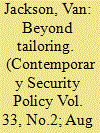

|
|
|
|
|
| Publication |
2012.
|
| Summary/Abstract |
How can one state maintain deterrence against another state undergoing an uncertain political transition? A debate within fourth wave deterrence theory focuses on whether and when a tailored approach, based on cultural, organizational, and idiosyncratic characteristics of a target state, has the greatest value. Tailored deterrence may not be appropriate under conditions of domestic political uncertainty in the target state, often those most in need of deterring. A more promising alternative for a defending state may be deterrence management. Deterrence management compensates for insufficient or low-confidence assessments of a target's values, organizational structure, power distribution, or cultural idiosyncrasies that prevent employment of tailored deterrence strategies intended to manipulate such factors. To make this case, I combine insights from deterrence theory with an exploration of the uncertain politics of a post-Kim Jong-il North Korea and the unpredictable process of power consolidation. Deterrence management may be applicable in cases of imperceptible leadership transitions in other target states. While no panacea, the deterrence management approach reinforces stability while remaining flexible enough to accommodate change.
|
|
|
|
|
|
|
|
|
|
|
|
|
|
|
|
| 3 |
ID:
114820
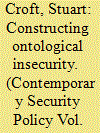

|
|
|
|
|
| Publication |
2012.
|
| Summary/Abstract |
The development of ontological security studies, for example by Mitzen, Steele, and Berenskoetter and Giegerich, has been an important innovation in the field. However, by focusing on the level of the state rather than that of the individual, this new tradition is somewhat different from the intellectual origins of ontological security in sociology and psychology. Drawing on those disciplines, I argue that the key focus should be on the understandings of individuals about their own security, intersubjectively constructed. Ontological security can be understood in terms of the need to construct biographical continuity, to construct a web of trust relations, to act in accordance with self-integrity, and to struggle against ontological insecurity, or dread, in Kierkegaard's sense. I then take and apply this framework to understand the process by which British Muslims have become insecuritized (understood as a term through which dominant power can decide who should be protected and who should be designated as those to be controlled, objectified, and feared) in the period since 9/11.
|
|
|
|
|
|
|
|
|
|
|
|
|
|
|
|
| 4 |
ID:
114825


|
|
|
|
|
| Publication |
2012.
|
| Summary/Abstract |
The peculiarities of Swiss security policy since the end of the Cold War are best explained not through Switzerland's structural position but through its unique strategic culture. Compared to other European neutrals, there are three particular idiosyncratic expressions of Switzerland's neutrality: strict adherence to institutional non-alignment in Swiss foreign and security policy; the Swiss army's militia principle; and the Swiss system of civil defence. Given their relative persistence despite radical changes in the strategic environment, these idiosyncrasies deserve more research attention and more theoretical scrutiny. This article argues that an examination of Swiss strategic culture, based on historical and identity narratives as well as public opinion, best explains the puzzle of distinctiveness. The article highlights the importance of the vernacular in conceptualizations of strategic culture, and explores the explanatory utility of strategic culture compared to explanations based on realist or institutional factors derived from rationalist theories. Strategic culture reveals current constraints imposed upon policymakers as well as ideological resources available for new directions in security policy. This analysis shows there is little room within Swiss strategic culture for a transformation of security policy, but there are opportunities for a discursive transformation of Swiss identity and strategic culture that allow for a better use of strategic and military resources.
|
|
|
|
|
|
|
|
|
|
|
|
|
|
|
|
| 5 |
ID:
114827
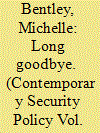

|
|
|
|
|
| Publication |
2012.
|
| Summary/Abstract |
This article responds to an earlier article by Christian Enemark to reassess the concept of weapons of mass destruction (WMD). How is the concept defined and can it be removed from policy and academic discourse? Firstly, this paper contests the reduction of WMD to mean a fixed set of armaments (nuclear, biological, and chemical weapons). In contrast to this essentialist approach, it uses American archival and policy examples to demonstrate that the concept has been defined in a wide variety of ways, choices that reflect the strategic and contextualized intent of the actors. Secondly, this article questions the assertion that the quality of strategic thought and security policy would be improved if the concept were abandoned. While the conflation of diverse weapons under the umbrella of WMD is problematic, the political nature of the concept's construction means its elimination is not straightforward. Conceptual change cannot be imposed independently of the way meaning is politically constructed. While not disputing the serious problems associated with allowing the WMD concept to survive, this article concludes that the real question here is one of context. Failing to address why and how it is used leads to underestimation of how likely removal is within the current discursive climate. As long as that value remains - as long as WMD is an effective resource for policymakers to shape security policy - there is little chance of being able to abandon the WMD concept in the foreseeable future.
|
|
|
|
|
|
|
|
|
|
|
|
|
|
|
|
| 6 |
ID:
114821
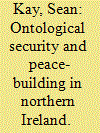

|
|
|
|
|
| Publication |
2012.
|
| Summary/Abstract |
Ontological security, which focuses on the security of oneself, one's identity, and group affiliations, best informs the nature of sectarian conflict and conflict resolutions in contemporary Northern Ireland. This article seeks to move the debates over the role of ontological security concepts in international relations by applying a mainly theoretical discussion to testable case studies. While high-end, official peacemaking can be explained by rational actor models, constraints on peace-building remain ontologically driven. This explains the dichotomy between the dramatic reduction of violence since 'the Troubles' and the existential anxieties that persist despite the peace process. In parts of Northern Ireland politics and security are ontologically defined. Choices that might not seem rational in the sense of value maximizing are better understood via this framework. Northern Ireland shows a clear correlation between ontological security frameworks and post-peace process developments. Ontological security also shows the possibilities and limits for exporting formally rational, state-centred models of peacemaking, and reminds us that the urban geographer might be as important a security actor as the diplomat or military representative.
|
|
|
|
|
|
|
|
|
|
|
|
|
|
|
|
| 7 |
ID:
136879
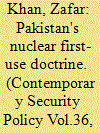

|
|
|
|
|
| Summary/Abstract |
A close look at the literature on Pakistan's nuclear weapons doctrine reveals the ambiguity in Pakistan's nuclear-use options. Pakistani officials and commentators leave open the possibility that Pakistan would use its nuclear weapon first, but it is not clear when, where, or how it would. Others conclude that Islamabad would use its nuclear weapon only as a last resort, but that condition too remains vague. This article examines the puzzle of Pakistan's nuclear weapons use, demonstrating that ambiguity plays a central role in Pakistan's nuclear weapons policy, much as nuclear ambiguity exists in each nuclear weapons state's policy. This article departs from previous research and commentary on Pakistan's nuclear doctrine by introducing the thesis that Pakistan's nuclear ambiguity is real, but far from internationally unique. Pakistan, like the USA at the onset of the nuclear era, relies on nuclear weapons for survival. The development of Pakistan's forces, including tactical nuclear weapons, suggests an emphasis on counterforce targeting. The role of domestic political processes, the civil–military dilemma and its impact on strategic policy in Pakistan, have received considerable attention, but still require untangling. Progress towards no first use probably requires changes to the conventional balance in South Asia, and stronger democratic, civilian rule in Pakistan, free of direct intervention from the army. Finally, global dynamics shaping the salience of nuclear weapons globally cannot be disregarded in any assessment of South Asian and Pakistani dynamics.
|
|
|
|
|
|
|
|
|
|
|
|
|
|
|
|
| 8 |
ID:
114826
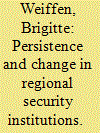

|
|
|
|
|
| Publication |
2012.
|
| Summary/Abstract |
This article follows the recent trend of bringing the Organization of American States (OAS) back into the debate on regional security, previously dominated by the accomplishments of European institutions and the shortcomings of their Asian and African counterparts. The study of the OAS is advanced here through application of an analytical framework derived from institutionalist theory. A security organization may change its form during its lifetime and pursue different kinds of tasks. The oldest regional security institution, the OAS was designed for collective security. This yielded to collective defence during the Cold War, and to cooperative security in the 1990s. After 11 September it returned to collective defence, but the contradictory reassertion of United States leadership and the emergence of South American regional power made hemispheric cooperation more difficult again. The OAS's main achievement is the extension of essential principles - democracy, human rights, and peaceful conflict resolution - to the entire hemisphere. As a diversified institution addressing a wide variety of security challenges, however, the OAS must find a coherent project alongside more focused sub-regional organizations such as the Union of South American Nations (UNASUR).
|
|
|
|
|
|
|
|
|
|
|
|
|
|
|
|
| 9 |
ID:
114828
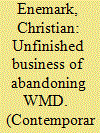

|
|
|
|
|
| Publication |
2012.
|
| Summary/Abstract |
Nuclear, biological, and chemical weapons are commonly lumped together as WMD. Such conflation is dangerous and misleading, rendering the term vulnerable to political manipulation. WMD language obscures the paramount threat of nuclear weapons, exaggerates the destructive power of chemical weapons, and is unhelpful or counterproductive when used in the context of biological weapons. In her response - the article entitled 'The Long Goodbye: Beyond an Essentialist Construction of WMD' (this journal), Michelle Bentley argues against adopting an essentialist understanding of WMD and poses the question: how do you convince political actors to discard a concept so useful to them? This reply highlights limitations to the political construction of meaning. Readers of this exchange should come away more hesitant about employing WMD language. Some might feel confirmed in their view that the political utility of this term - founded on apocalyptic vagueness - will endure for a long time. Subscribers to either perspective should agree that academics - as builders, users, and shapers of language - have a role to play in the important business of abandoning this troublesome term.
|
|
|
|
|
|
|
|
|
|
|
|
|
|
|
|
| 10 |
ID:
114824
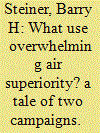

|
|
|
|
|
| Publication |
2012.
|
| Summary/Abstract |
Longer wars between mismatched opponents often end with the militarily weaker side showing unexpected strengths. This article tests this tendency in two short wars in which overwhelming force superiority was applied in massive air attacks. Operation Enduring Freedom (the 2001 American campaign in Afghanistan) and Operation Cast Lead (the 2008-2009 Israeli campaign in Gaza) both began with air offensives that shifted to air-supported ground combat, but Enduring Freedom (a Type A operation) gave priority to aerial attack, while in Cast Lead (Type B) air operations primarily paved the way for ground combat. Neither campaign was fully decisive, suggesting that the residual capabilities of weaker combatants apply to short as well as protracted hostilities. The Type A attack was decisive against the Taliban, but not against al Qaeda. The more intensive Type B case, Cast Lead, did not lead to greater decisiveness than its counterpart, with Israel emphasizing force demonstration to enhance deterrence of attack, yet not seeking to destroy Hamas's residual military capability. The problem of translating large military superiority into decisive war results is also evident recently in more common, stretched out, and restrained airpower use supporting higher-priority ground combat, as in NATO's 2011 intervention in Libya and the aerial drone campaign in Pakistan supporting NATO war making in Afghanistan.
|
|
|
|
|
|
|
|
|
|
|
|
|
|
|
|
|
|
|
|
|